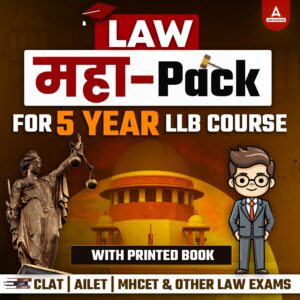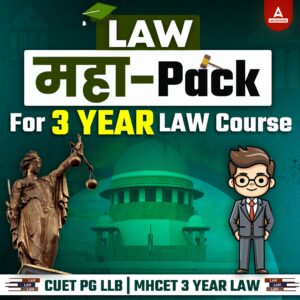CLAT Legal Reasoning Most Expected Questions: Ever wondered what kind of legal reasoning questions you might face in the CLAT (Common Law Admission Test)? If yes, then you’re at the right place! Legal reasoning is one of the key sections of CLAT 2026. Practicing the most common questions can significantly improve your preparation. These questions test not only your understanding of legal principles but also your ability to apply them to real-life situations. In this article, we provide a list of the most expected CLAT legal reasoning questions that every aspirant should practice. With these, you can sharpen your skills, improve accuracy, and stay ahead in the competition.
CLAT Legal Reasoning Exam 2026
The CLAT Legal Reasoning exam is one of the most important sections of the Common Law Admission Test (CLAT). It tests a student’s analytical and logical thinking. This exam is open to students who have finished or are currently in Class 12. This makes them eligible for admission. With CLAT, students can pursue courses like 5-year integrated LLB programs such as BA LLB, BBA LLB, B.Com LLB, and B.Sc LLB, offered by top National Law Universities. For graduates, it also provides the LLM program. Understanding eligibility and courses helps students plan their legal careers with clarity and confidence.
CLAT 2026 Legal Reasoning Most Expected Questions
For the year 2025-26, the Consortium of National Law Universities (NLUs) has decided to conduct the CLAT 2026 exam on December 7, 205. It is one of the most important law entrance tests for students who want to join top NLUs. The exam takes place in offline mode. It mainly checks students’ reading, reasoning, and analytical skills instead of memorisation.
Among all the sections, Legal Reasoning is crucial. It tests how well students can understand legal principles and apply them to real-life situations. Knowing the most expected legal reasoning questions is important because it helps students prepare effectively, focus on the right areas, and save time when revising. These questions also boost confidence and improve problem-solving speed for the final exam.
Most Expected Questions for CLAT Legal Reasoning Exam
Passage 1
The government has amended the Electoral Bond Scheme, 2018. The Ministry of Finance on November 7, 2022, issued a notification for amending the scheme to provide “an additional period of 15 days” for their sale “in the year of general elections to the Legislative Assembly of any States or Union Territories with Legislature”. The bonds under this scheme are usually made available for purchase by any person for a period of ten days each in the months of January, April, July, and October, when specified by the Union Government. The original scheme had provided for an additional period of thirty days, as specified by the Government, in the year when Lok Sabha elections are held, while the amendment adds another 15 days.
Since Assembly elections to various States and Union Territories are held every year, the amendment effectively means that there will be 15 additional dates annually during which the bonds can be sold. Immediately after issuing the notification, the Union Government also announced the sale of electoral bonds under the 23rd tranche from the authorised branches of the State Bank of India. The notification said the sale of bonds would take place through the 29 authorised branches of the said bank from November 9 to November 15, 2022. Like in previous rounds of sale, the electoral bonds shall be valid for 15 calendar days from the date of issue and no payment shall be made to any payee political party if the bond is deposited after expiry of the validity period. The Electoral Bond deposited by an eligible political party in its account shall be credited on the same day.
Questions and Answers Regarding Passage 1:
Q1. Assad buys an electoral bond worth ` 1,00,000/- on November 9, 2022 and plans to give the bond to the Popular People’s Party (the “PPP”), which he has been supporting for many years. On November 10, he must travel out of station on some urgent business, and he only hands the bond over to a representative of the PPP on November 14, 2022. The PPP’s representative deposits the bond in the Party’s account on November 16, 2022, but the bank refuses to credit the bond to the party’s account, on the grounds that it was no longer valid. Is the bank correct?
- No, since Assad was a long-time supporter of the PPP.
- Yes, since the bonds were only issued from November 9 to November 15, 2022 and were invalid after that.
- Yes, since the party representative had not deposited the bond with an authorised branch of the bank.
- No, since the bond was valid on November 16, 2022.
Q2. The Government announces that there would be a sale of a 24th tranche of electoral bonds on February 10, 2023, for a period of 15 days, since elections to the Legislative Assembly of some States are scheduled for that year. Since there are no elections to the Lok Sabha or the Legislative Assembly of the State in which Assad resides, he claims that the Government does not have the power to issue this 24th tranche of electoral bonds in 2023. Is he right?
- No, since the changes to the Electoral Bond Scheme, 2018 mean that electoral bonds can be issued for an additional period of 15 days in any year, regardless of whether any elections are scheduled that year.
- Yes, since no elections were scheduled for Assad’s state in that year.
- Yes, since the Government had already sold some bonds in the 23rd tranche in 2022.
- No, since the changes to the Electoral Bond Scheme, 2018 provide that electoral bonds can be issued for an additional period of 15 days in years when there is an election to the Legislative Assembly of a State.
Q3. On November 10, 2022, Palak purchases an electoral bond from a branch of the State Bank of India, and hands it over to a representative of the PPP. The next day, the PPP announces that it has changed its candidates for the upcoming elections in Palak’s State. Upset at this news, she tells a PPP representative that she would like her bond back. The representative tells her that the bond has already been deposited, and that the money has been credited to the party’s account. Palak claims that since the period of validity of the bonds has not expired, she has the right to get her bond back from the party. Is she right?
- No, since Palak cannot ask for the bond back once she has given it to a political party.
- No, since the party had already deposited the bond, and the money had been credited to its account.
- Yes, since Palak bought the bond with her own money, and has the right to ask for it back.
- Yes, since the PPP changed its candidates, and Palak may no longer support the party.
Q4. On November 15, 2022, the Government issues another notification, announcing that from that date onwards, only political parties that have received at least 1% of the votes polled in the last elections to the Lok Sabha, or the last elections to the Legislative Assembly of a State, would be eligible to receive and deposit electoral bonds. In the sale of the 24th tranche of electoral bonds, Palak decides to give the electoral bonds she has purchased to the newly formed More Popular People’s Party (the “MPPP”), which is likely to win the first elections it would be contesting, in July 2023. Is the MPPP eligible to receive the electoral bonds?
- Yes, since it is likely to succeed in the upcoming elections.
- Yes, since it fulfils the criteria announced in the November 7, 2022 notification.
- No, since it does not fulfil the eligibility criteria announced in the November 15, 2022 notification.
- No, since it does not fulfil the eligibility criteria announced in the November 7, 2022 notification.
Q5. Abraham, who lives in a different State from Assad, purchased an electoral bond in the sale of the 23rd tranche. He decides to give the electoral bond to the PPP, even though the PPP is only active in Assad’s State. When the PPP representative goes to an authorised branch of the State Bank of India to deposit the electoral bond on December 5, 2022 however, the bank refuses to credit the money to the PPP’s account. Which of the following would be the most valid reason for the bank to refuse to credit the money to the party’s account?
- The bond was no longer valid.
- Abraham could not give the bond to the PPP since the PPP was not active in his state.
- The PPP was not eligible to receive electoral bonds.
- The PPP could only deposit the bond in a bank branch located in Abraham’s state.
Passage 2
Free legal aid is the provision of free legal services in civil and criminal matters for those poor and marginalised people who cannot afford the services of a lawyer for the conduct of a case or a legal proceeding in any Court, Tribunal or Authority. These services are governed by the Legal Services Authority Act, 1987 (the “Act”) and provided by the National Legal Services Authority (“NALSA”).
Provision of free legal aid includes:
- Representation by an advocate in legal proceedings;
- Payment of process fees, expenses of witnesses and all other charges payable or incurred in connection with any legal proceedings in appropriate cases;
- Preparation of pleadings, memo of appeal, paper book including printing and translation of documents in legal proceedings;
- Drafting of legal documents, special leave petition etc.; and
- Supply of certified copies of judgments, orders, notes of evidence and other documents in legal proceedings.
Free legal aid also includes provision of aid and advice to the beneficiaries to access benefits under welfare statutes and schemes framed by the Central Government or the state governments and to ensure access to justice in any other manner. Free legal aid is not confined to cases before the subordinate courts. Free legal aid must be provided to the needy from the lowest court to the Supreme Court of India. According to Section 13(1) of the Act, any individual who satisfies any criteria under Section 12 is entitled to receive free legal aid, provided that NALSA is satisfied that such person has a genuine case to prosecute or defend the matter. There is hence no bar as to which kind of cases one can apply and not apply for. Section 12 of the Act includes the following:
- a member of a Scheduled Caste or Scheduled Tribe;
- a woman or a child;
- a person with a disability;
- an industrial workman; or
- a person in police custody.
Questions and Answers Regarding Passage 2:
Q6. Divya was arrested by the police and charged with having committed a murder. She was convicted by the trial court and appealed to the high court. She lost her appeal there and decided to appeal to the Supreme Court. By this time she has run out of money, so she approaches NALSA and asks them to help her get an advocate who can represent her before the Supreme Court. Is Divya entitled to support from NALSA?
- No, since she should have approached them at the beginning of the case before the trial court, and not at such a late stage.
- Yes, since her previous lawyers were incompetent, and that is why she lost the matter in the trial court and the high court.
- Yes, she is entitled to free legal aid in the Supreme Court proceedings because she is a woman.
- No, since she had been accused of having committed the heinous crime of murder.
Q7. Divya is acquitted by the Supreme Court and goes back to her regular life. Some days later, she has a fight with her neighbour Riya over a petty matter and decides to file a criminal case against her. She approaches NALSA for free legal aid to prosecute the matter. She tells NALSA representative that she knows she does not have a genuine case, but just wants to harass Riya. NALSA refuses to provide Divya free legal aid because they believe she does not have a genuine case to prosecute. Can NALSA do so?
- Yes, since Section 13(1) of the Act provides that free legal aid can be provided if NALSA is satisfied the person has a genuine case to prosecute, and they did not believe that Divya had a genuine case to prosecute.
- Yes, since Divya had earlier been prosecuted for the crime of murder.
- Yes, since Divya had already applied for free legal aid from NALSA in the past and could not repeatedly ask NALSA for such assistance.
- No, since Divya is a woman, and is included within the list of people entitled to free legal aid from NALSA under Section 12 of the Act.
Q8. Incensed at Divya, Riya decides to file a civil case against Divya, claiming that Divya had violated the terms of a contract they had made some time back. Divya approaches NALSA for free legal aid to defend the matter, which NALSA agrees to provide. Since Riya is also short of funds, she too approaches NALSA for free legal aid. NALSA refuses to provide legal aid to Riya, since they are already providing Divya free legal aid in the same case. Is NALSA right in refusing free legal aid to Riya?
- Yes, since NALSA cannot provide free legal aid to opposing parties in the same matter.
- Yes, since NALSA does not provide free legal aid in civil matters.
- No, since Divya had filed a frivolous case against Riya in the past, and Riya was entitled to retaliate by filing another case against Divya.
- No, since Riya is a woman, and is entitled to free legal aid as long as NALSA is satisfied she has a genuine case.
Q9. Farhan is an up-and-coming artist and makes a living selling his paintings. Since he is not very well known yet, he isn’t able to sell too many paintings, and is dependent on aid from the government and well-wishers. He reads about a new Central Government scheme in the papers one day, under which artists would be provided a monthly stipend by the local government. Since he finds the language of the scheme document very complex to understand, he approaches NALSA for help in understanding the scheme and obtaining the stipend. Is he entitled to free legal aid from NALSA in this regard?
- No, since free legal aid does not include provision of help to understand and access benefits under government schemes.
- No, since he does not fit within any of the categories under Section 12 of the Act.
- Yes, since free legal aid includes provision of help to understand and access benefits under government schemes.
- Yes, since he is a struggling artist, and is dependent on aid for survival.
Q10. Vikram is a rich businessman and has a huge art collection. Farhan invites Vikram to his studio one day, hoping to convince Vikram to buy some of his paintings. Vikram doesn’t buy any of his paintings, but after he leaves, Farhan notices that one of his newest paintings is missing. He suspects that Vikram has stolen it, and complains to the police, who promptly arrest Vikram. Vikram approaches NALSA for free legal aid, so that he can obtain bail. Is Vikram entitled to free legal aid from NALSA?
- No, since he is a rich businessman and can hire a lawyer with his own money.
- Yes, since he was innocent.
- Yes, since he was in police custody.
- No, since he had stolen from a struggling artist.
Passage 3
Quashing a case of cruelty that was filed against a man by his wife, the Bombay High Court said that if a married lady is asked to do household work for the family, it cannot be said that she is treated “like a maid servant”. The Court was hearing an application by the husband and his parents seeking that proceedings against them are quashed. A First Information Report (“FIR”) was filed against the trio in September 2020, around nine months after the marriage, alleging that they hounded the woman for money to purchase a car, harassed her mentally and physically and treated her like a maid servant. Examining the evidence, the Court found that there was no merit to the woman’s allegations. The Court said that though the FIR says that she was treated properly for about a month and then “like a maid servant”, there are no details of what this meant. The Court added: “If a married lady is asked to do household work for the purpose of the family, it cannot be said that it is like a maid servant.” The Court held that the mere use of the word harassment “mentally and physically” in the FIR is not sufficient to constitute an offence Section 498A of the Indian Penal Code (“IPC”), which punishes the husband, or a relative of the husband of a woman who subjects her to cruelty in any way. It is interesting to note that Section 498A of the IPC also provides that if a married woman is actually treated like a ‘maid servant’, it would be an offence under that Section.
Questions and Answers Regarding Passage 3:
Q11. Ashwin and Ashima were married in February 2020. In March 2020, Ashwin asked Ashima to take care of all their household work, such as cooking, cleaning, and other domestic chores, as he was very busy with his professional responsibilities. Ashima claims that this amounts to treating her like a maid servant and constitutes an offence under Section 498A of the IPC. Applying the Bombay High Court decision, is she likely to succeed?
- Yes, since Ashwin had only asked Ashima to do their household work, and not for others.
- No, since Ashwin had only asked Ashima to do their household work, and not for others.
- Yes, since Ashwin had asked Ashima to do household work for themselves as well as others.
- No, since treating a married woman like a maid servant would not amount to an offence under that Section.
Q12. In April 2020, Ashwin’s friend Rakesh visits Ashwin and Ashima’s home, and stays with them for a few days. During his visit, he is very mean to Ashima, and uses abusive language with her. He also threw a plate at her one evening when he was unhappy with the meal that she had prepared. Ashima now claims that Rakesh has committed an offence under Section 498A of the IPC. Is she likely to succeed?
- No, since Rakesh’s actions were perfectly justifiable for a man who does not get a well-cooked meal.
- Yes, since Rakesh’s use of abusive language and throwing the plate at Ashima clearly amount to cruelty.
- No, since Rakesh is not her husband, nor is he related to Ashwin.
- Yes, since Rakesh was staying at Ashwin and Ashima’s home at the time of the incident.
Q13. Frustrated and upset with her marriage, Ashima applies for and is granted a divorce from Ashwin in November 2020. Since she and Ashwin had been friends for many years before they got married, she stays in touch with him. She moves into her own apartment and starts going to office regularly at a new job. Ashwin is very upset at this and starts treating Ashima very cruelly. Ashima again claims that Ashwin has committed an offence under Section 498A of the IPC. Is she right?
- Yes, since Ashwin has, as we are told, treated her cruelly.
- Yes, since Ashwin has been her husband.
- No, since Ashwin was understandably upset at Ashima’s behaviour.
- No, since she is no longer married to Ashwin.
Q14. Assume that the government passes a new law in January 2021, called the Protection of Rights of Married Women Act, 2021 (the “PoMWA”), according to which, asking a married woman to take care of household chores would be an offence. The PoMWA also provides that if a man commits such an offence, he would have to pay compensation to the woman. The PoMWA even applies to actions that were committed any time in the three years prior to the new law coming into force, and even if the man and woman involved in the matter were no longer married. Upon hearing about this new law, Ashima once again alleges that Ashwin has committed an offence under Section 498A of the IPC, and claims compensation under the PoMWA for his actions. Is she right, and will she succeed?
- Ashima is right about Ashwin committing an offence under Section 498A of the IPC, but she will not get compensation under the PoMWA.
- Ashima will get compensation under the PoMWA, but she is not right about Ashwin committing an offence under Section 498A of the IPC.
- Ashima will get compensation under the PoMWA, and she is also right about Ashwin committing an offence under Section 498A of the IPC.
- Ashima will neither get compensation under the PoMWA, nor is she right about Ashwin committing an offence under Section 498A of the IPC.
Q15. Assume that in March 2021, the government changes Section 498A of the IPC. The effect of this change is that asking a married woman to do household chores — even for their own family — by herself would be considered cruelty, and therefore, an offence under the Section. Some days after this change comes into effect, Shamita, Ashima’s friend at work, tells her that her husband has been forcing her to do all the household work by herself. Ashima tells Shamita that her husband’s actions would amount to an offence under Section 498A of the IPC, even though Ashima herself has been unsuccessful in having Ashwin convicted under that Section in the past. Is Ashima’s advice to Shamita correct?
- Yes, since Section 498A has now been changed, and Shamita’s husband’s actions would now be an offence under the changed Section 498A.
- No, since Ashima has been unsuccessful in having Ashwin convicted under that Section in the past.
- Yes, since the passing of the Protection of Married Women Act has resulted in Shamita’s husband’s actions being made illegal.
- No, since Ashima is only Shamita’s friend, and only the married woman herself can file a complaint under Section 498A of the IPC.
Why are the CLAT Legal Reasoning Most Expected Questions Important?
The most expected questions play a key role in preparation as they give students a clear idea of what type of passages, principles, and case-based questions can appear. Practising these questions not only improves accuracy but also boosts confidence before the exam. Importance of CLAT Legal Reasoning: Most Expected Questions hav been shared below:
- Exam-Focused Practice – Helps students focus on the questions most likely to come in the exam.
- Better Understanding – Builds clarity on legal principles, case laws, and application-based reasoning.
- Time Management – Practicing expected questions improves speed and efficiency in solving passages.
- Boosts Confidence – Gives students a real exam-like experience and reduces stress.
- Score Improvement – Increases chances of securing higher marks in the legal reasoning section.
- Smart Preparation – Saves time by directing efforts toward the most important areas.
Common Mistakes to Avoid in CLAT Legal Reasoning
1. Using outside knowledge:
Don’t use what you already know about law. Answer only according to the rule or principle given in the question.
2. Missing important words:
Pay attention to words like only, must, may, or not. These small words can completely change the meaning of the question.
3. Skipping the passage:
Don’t hurry. Read the whole passage carefully to understand the situation before choosing your answer.

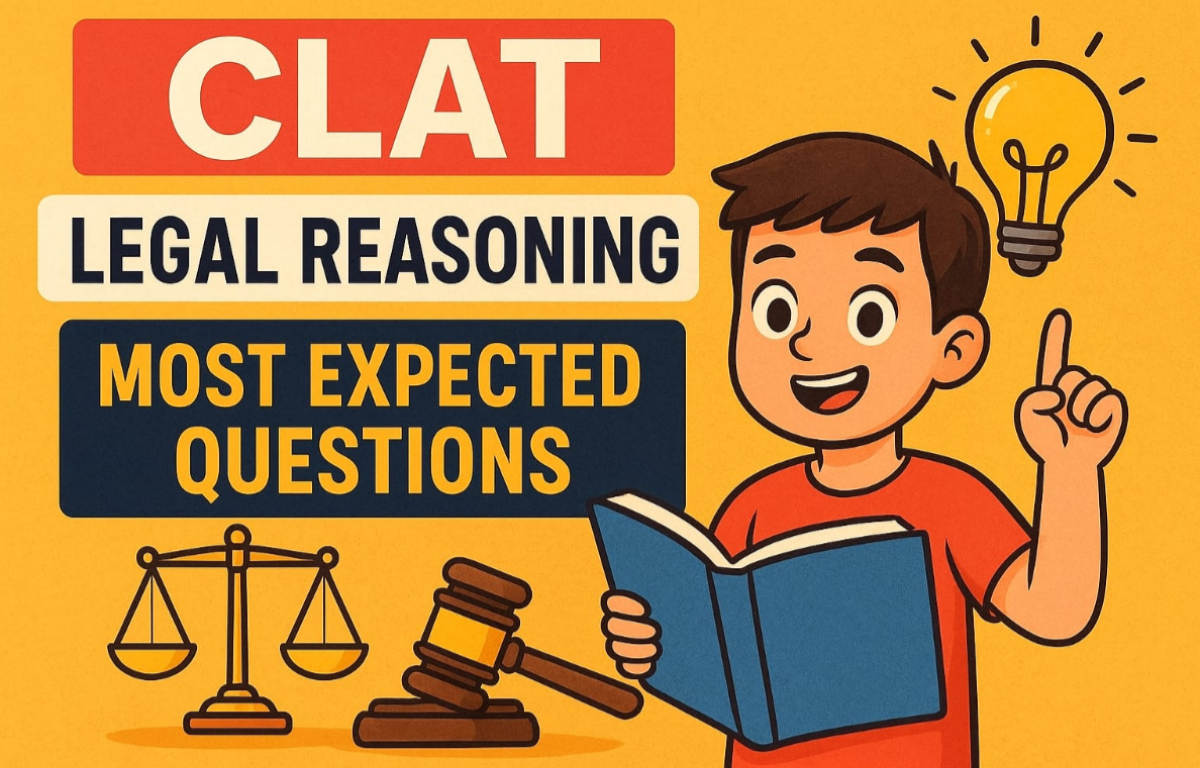
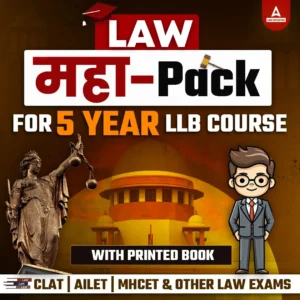
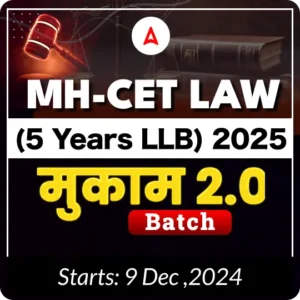







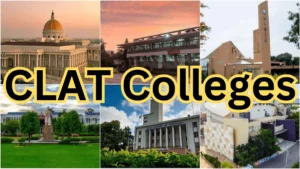 CLAT Colleges 2026 List: Check Top Unive...
CLAT Colleges 2026 List: Check Top Unive...
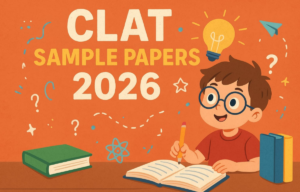 CLAT Sample Papers 2026 Released by Cons...
CLAT Sample Papers 2026 Released by Cons...
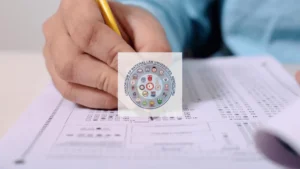 Download CLAT Previous Year Question Pap...
Download CLAT Previous Year Question Pap...
